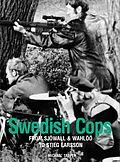Michael Tapper considers Swedish culture and ideas from the period 1965 to 2012 as expressed in detective fiction and film in the tradition of Maj Sjowall and Per Wahloo. Believing the Swedish police narrative tradition to be part and parcel of the European history of ideas and culture, Tapper argues that, from being feared and despised, the police emerged as heroes and part of the modern social project of the welfare state after World War II.
Establishing themselves artistically and commercially in the forefront of the genre, Sjowall and Wahloo constructed a model for using the police novel as an instrument for ideological criticism of the social democratic government and its welfare state project. With varying political affiliations, their model has been adapted by authors such as Leif G. W. Persson, Jan Guillou, Henning Mankell, Hakan Nesser, Anders Roslund and Borge Hellstrom and Stieg Larsson, and in film series such as Beck and Wallander. The first book of its kind about Swedish crime fiction, Swedish Cops is just as thrilling as the novels and films it analyses.
Autorentext
Michael Tapper is former editor-in-chief of Film International (2003-04) and its Swedish predecessor Filmhäftet (1998-2002). He has a Ph.D. in Cinema Studies at Lund University, Sweden, and besides writing books on film he is a film critic at Sydsvenska Dagbladet since 1999 and regular contributor to Nationalencyklopedin since 1989 (web edition at: www.ne.se since 1996). He was on the editorial board of Cinema Journal 2003-07 and has contributed to Historical Journal of Film, Radio and Television as well as continuing to contribute to Film International. Since 2011 he is an affiliated researcher at at the Centre for Literature and Languages, Lund University.
His archive including over 1 800 texts is available free of charge and advertisements at: www.michaeltapper.se.
Books (author):
Ingmar Bergman's 'Face to Face' (London & New York: Wallflower Press, 2017)
Swedish Cops: From Sjöwall & Wahlöö to Stieg Larsson (Intellect Books, 2014)
Snuten i skymningslandet: Svenska polisberättelser i roman och film 1965-2010 ('The Cop in the Twilight Land: Swedish Police Narratives in Novels and Films 1965-2010'; Lund: Nordic Academic Press, 2011)
Clint Eastwood (Malmö: Historiska Media, 2011).
Books (contributor):
"Sekten och Syndafloden: Noah från forntida saga till modernkatastroffilm" in Ulf Zander & Isak Hammar (eds.) Svärd, sandaler och skandaler: Antiken på film och i tv (Lund: Studentlitteratur, 2015)
"Stockholm Noir: Neoliberalism as Gangsterism in Easy Money" Tommy Gustafsson & Pietari Kääpä (eds.)in Nordic Genre Film (Edinburgh: Edinburgh University Press, 2015).
"Hjälten som martyr och monster: Breivik, Hamilton och nationens kropp" in Erik Hedling & Ann-Kristin Wallengren (red.) Den nya svenska filmen: Kultur, kriminalitet & kakofoni (Stockholm: Atlantis 2014)
"Dirty Harry in the Swedish Welfare State" in Andrew Nestingen & Paula Arvas (eds.) Scandinavian Crime Fiction (Cardiff: Wales University Press, 2011).
"Hans kropp - samhället självt: Manliga svenska mordspanare på ålderns höst" in Gunhild Agger & Anne Marit Waade (eds.) Den skandinaviske krimi som medieprodukt ('Scandinavian Crime Fiction as Media Product'; Gothenburg:Nordicom, 2010)
"Skymningslandet: Kriminaliteten som hot mot Sverige i Johan Falk-trilogin" in Erik Hedling & Ann-Kristin Wallengren (eds.) Solskenslandet. Svensk film på 2000-talet ('The Sunshine Land: Swedish Film in the 2000's'; Stockholm: Atlantis 2006)
Texts on Körkarlen, Scarface: Shame of a Nation, My Man Godfrey, Sommarnattens leende, Persona, Vargtimmen, Harold and Maude, Faustrecht der Freiheit, The Terminator and Salvador in Steven Jay Schneider (ed.) 1001 Movies You Must See Before You Die (London: New Burlington Books, 2003)
"A Romance in Decomposition: Interview with Lars von Trier" in Jan Lumholdt (ed.) Lars von Trier: Interviews (Jackson, Miss: University Press of Mississippi, 2003)
"Spartacus: Ett slauppror i ideologisk korseld" in Lars M. Andersson & Ulf Zander (eds.) Mer än tusen ord. Bilden och de historiska vetenskaperna ('More Than a Thousand Words: The Image and the Historical Sciences''; Lund: Nordic Academic Press 2001)
Svensk filmografi vols. 8 and 9 ('Swedish Filmography 1980-89 and 1990-99'; Stockholm: Swedish Film Institute, 1997 and 2000)
Nationalencyklopedin ('The Swedish National Encyclopedia'; Höganäs: Bokförlaget Bra Böcker, 1990-1996)
Inhalt
Introduction
Chapter 1 - The Crime Genre
Origins
Crime and the Law
Chapter 2 - Enter the Police
A Genre is Born
The Police and the Welfare State
Backlash
Dirty Harry
Crime and Civilization
Crime Dystopia: The Psychopath and the Serial Killer
Chapter 3 - Crime Scene: Sweden
A Beginning
Gemeinschaft and Gesellschaft and the Nation
Crime and Nationality
The Young Savages of the Asphalt Jungles
The Hoodlum Film
The Politics of Crime
From Punishment to Reform and Back Again
Moral Panics and Crime Journalism
Print the Faction!
Chapter 4 - The 1960s and 1970s: Sjöwall and Wahlöö
Liberal-Conservative Criticism of the Welfare State
Criticism from within the Labour Movement
New Left Criticism of the Welfare State
Eco-Humanist or Green Criticism of the Welfare State
Per Wahlöö and Maj Sjöwall before Sjöwall and Wahlöö
Story of a Crime: Sjöwall and Wahlöö from Freud to Marx
The Film Adaptations
Chapter 5 - The 1980s: Leif G.W. Persson and Jan Guillou
Leif G.W. Persson
Jan Guillou
Chapter 6 - The 1990s: Henning Mankell and Håkan Nesser
Henning Mankell
Håkan Nesser and the Eurocop from Neverland
Chapter 7 - Millennium Cops
Crime and punishment in the Age of War on Terror
'Europudding' Police
Son of Dirty Harry: Beck and the Iconic Rise of Gunvald Larsson
Roslund and Hellström
Steig Larsson
Leif G.W. Persson: Downfall of the Welfare State
Chapter 8 - Into the Twilight
Cops and the Gemeinschaft/Gesellschaft Dichotomy
The Vigilante Cop and Right-wing Extremism
The Vigilante Cop and Fascism
The Challenge of Evil
